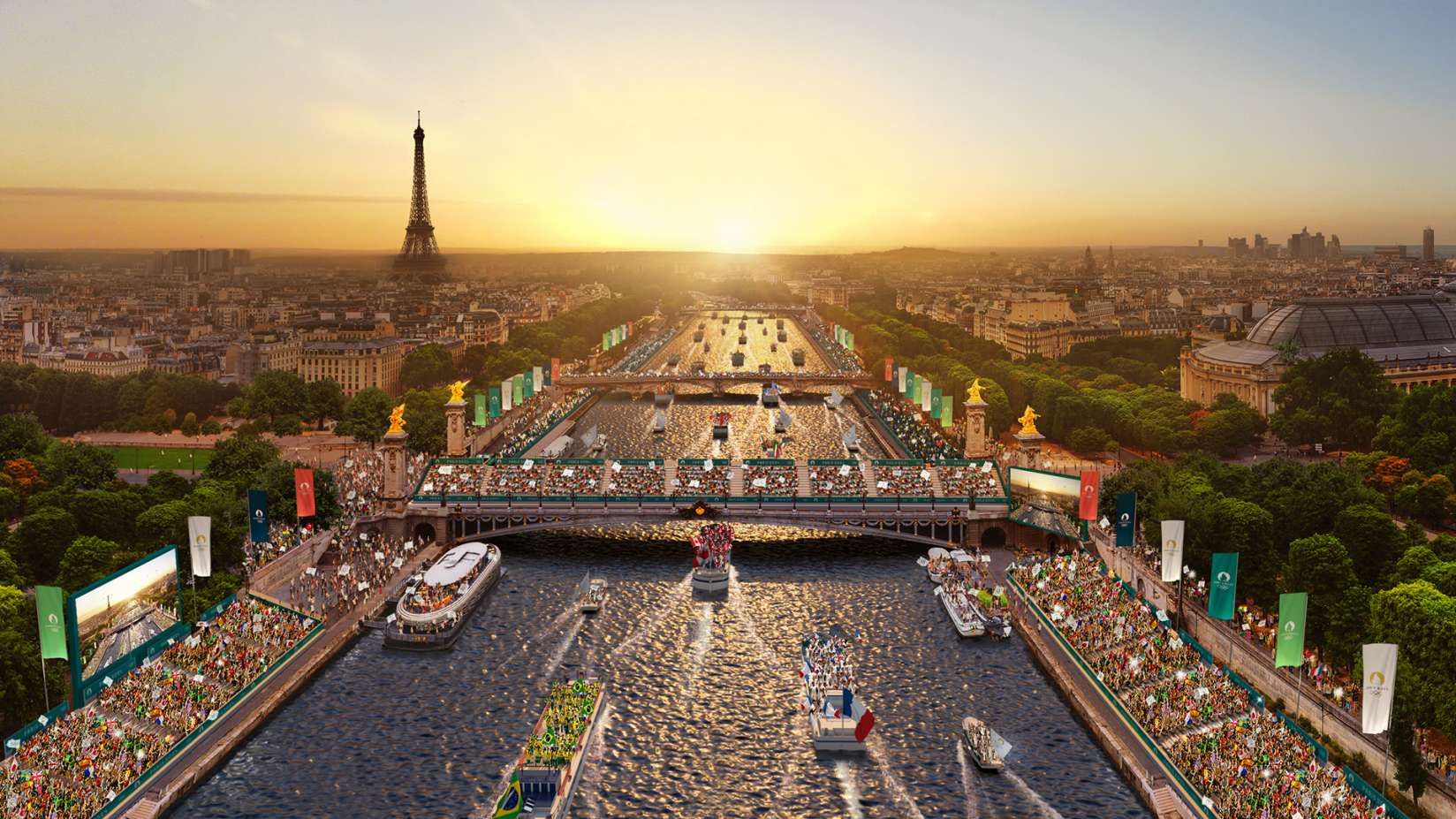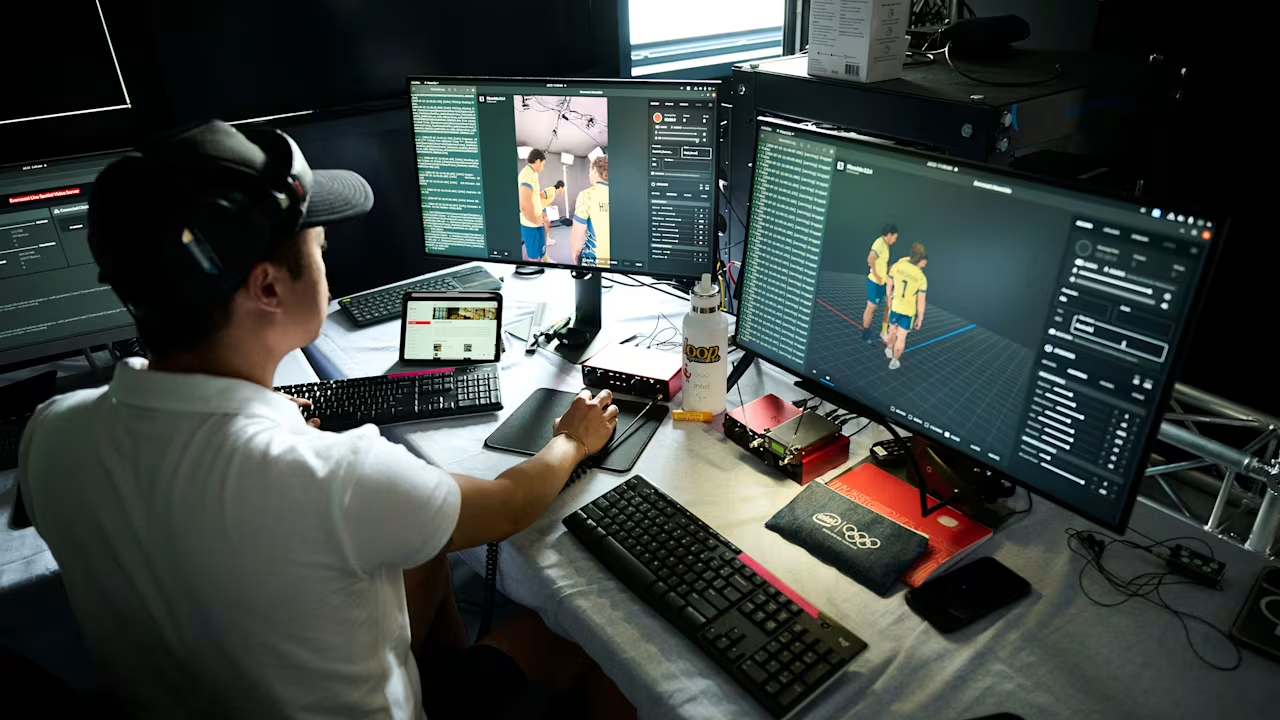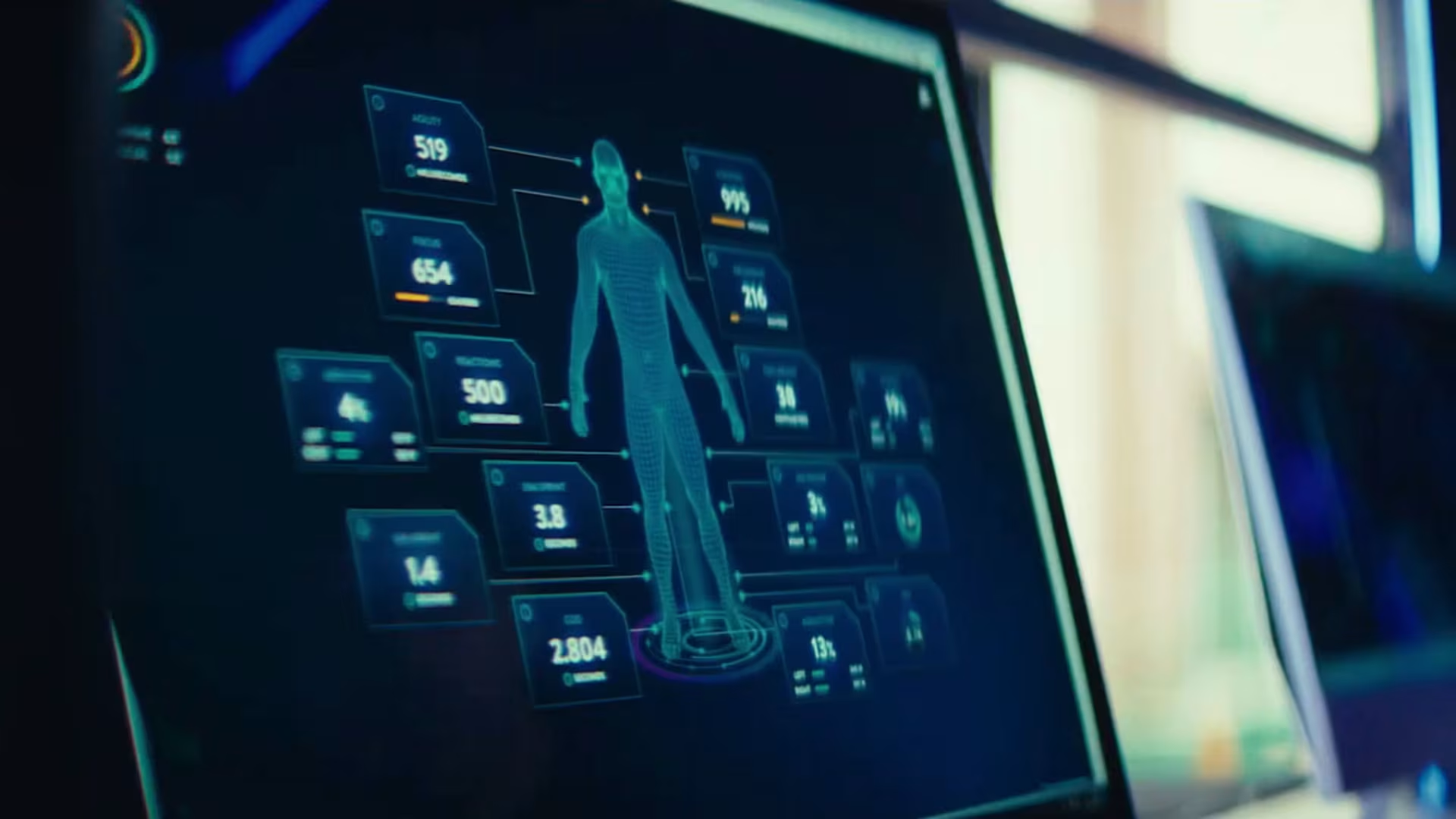business resources
How AI Innovations From Intel AI Are Redefining Olympic Experiences: A Paris 2024 Case Study
13 Aug 2024, 1:08 pm GMT+1
The Intel and International Olympic Committee (IOC) partnership for Paris 2024 is valued at $400 million. With enhanced HD broadcasting and event planning tools like OnePlan's 3D mapping, Intel is leveraging advancements made in AI, IoT, and digitalisation to shape the future of sports by integrating the overall experience with technology.
The Paris 2024 Olympics and Paralympic Games mark the dawn of a new era in the history of sports; an era where artificial intelligence (AI) integrates with sports, revolutionising the way the games are experienced, both on and off the field.
From enhancing athlete performance to transforming fan engagement and broadcasting, AI has redefined every aspect of these global events. Intel serves as the Official Worldwide AI Platform Partner of the Olympic and Paralympic Games Paris 2024.
Broadly speaking, the global sports technology market was valued at nearly $16 billion in 2023 and is expected to hit $68 billion by 2031, with a CAGR of 19.9%, as per Data Bridge Market Research. Major technology giants are leveraging AI to offer innovative solutions to their sporting event partners, like IBM and The All England Lawn Tennis Club (AELTC) partnership for Wimbledon and the most recent Intel and International Olympic Committee (IOC) partnership for Paris 2024.
These collaborative efforts not only elevate the overall sports experience for fans and athletes; but set the stage for a future where their integration defines a new terminology, the sports economy, as we call it.
Sarah Vickers, leader of Intel’s Olympic and Paralympic Games Office explains the mission of this partnership:
“The Olympic and Paralympic Games are the world’s biggest showcase for the best athletes to push the boundaries of possibility and do things we never thought possible. This summer, Intel will accelerate its mission of bringing AI Everywhere using Intel solutions at Paris 2024, showcasing the powerful potential of technology and AI to create immersive and interactive experiences at the Olympic and Paralympic Games Paris 2024 for millions around the world.”
The heritage of Intel at the Olympics and Paralympics
The journey of Intel and IOC partnership began with the Olympic Winter Games PyeongChang 2018, featuring the iconic Intel® Shooting Star™ drone display. Intel has been driving innovation at the Olympic and Paralympic Games, advancing the use of 5G, VR, drones, and AI technology to elevate the sports experience.
At Tokyo 2020, Intel® Premium drones soared through the sky to symbolise global unity post-pandemic. Intel also introduced 3D athlete tracking and VR training in 2020 and enabled the first live 5G broadcast in Beijing in 2022.
Ilario Corna, Chief Information Technology officer at the International Olympic Committee: “Our partnership with Intel has propelled us into a realm where emerging technologies, powered by artificial intelligence, are reshaping the world of sport for spectators, athletes, IOC staff and Partners.
Through their AI-powered solutions, Intel has enabled us to deploy AI faster than ever before. Together, in Paris 2024, our collaboration will create an Olympic experience like never before, embodying our shared commitment to building a better world through sport.”
The Intel International Olympic Committee (IOC) partnership for Paris 2024 events introduces a generative AI (GenAI) retrieval-augmented generation (RAG) solution, named AthleteGPT.
This innovative tool, integrated into the Athlete365 platform, utilises Intel’s Gaudi accelerators and Xeon processors to provide real-time support to over 11,000 athletes from diverse linguistic backgrounds.
Use of technology at The Olympics and Paralympics: A timeline
Technology in the Olympics and Paralympics has dramatically evolved, reshaping the way these events are conducted and experienced. Here’s a timeline showcasing pivotal moments when technology made a significant impact:

1912 Stockholm Olympics: Electronic timing for track events marks the start of precise timekeeping in sports.
1936 Berlin Olympics: First Olympic broadcast on television, reaching a limited audience in Berlin and setting the stage for global broadcasting.
1960 Rome Olympics: The first live telecast of the Olympics to a global audience brings the games into homes worldwide.
1964 Tokyo Olympics: Introduction of computers for result processing and electronic timing systems for swimming.
1972 Munich Olympics: Debut of photo-finish cameras for accurate results in close races.
1980 Moscow Olympics: Use of the Omega electronic starting gun and touchpads for swimming, improving race accuracy.
1984 Los Angeles Olympics: Digital timekeeping and large-scale electronic scoreboards make their debut.
1992 Barcelona Olympics: Spectators get their first taste of online coverage of the games.
1996 Atlanta Olympics: Launch of the official Olympics website, offering real-time information and event schedules.
2000 Sydney Olympics: The games go fully digital with all video content produced and stored digitally.
2008 Beijing Olympics: High-definition broadcasts and 3D athlete tracking technology enhance performance analysis.
2012 London Olympics: Widespread use of social media platforms like Twitter and Facebook, plus mobile apps for live streaming and updates.
2016 Rio Olympics: Introduction of 4K Ultra HD broadcasts and virtual reality content. Paralympics see advancements in prosthetics and assistive technologies.
2020 Tokyo Olympics and Paralympics: Postponed to 2021 due to COVID-19, but feature AI for event analysis, robotic assistance, and 5G technology. The Paralympics showcases modern assistive devices and prosthetics.
Future Innovations: Anticipated advancements include wearable technology, AI-driven performance analytics, and enhanced broadcast technologies like 8K and VR, continuing to revolutionise the Olympics and Paralympics.
How does Intel bring an immersive fan experience to the Stade de France?
At the Stade de France, the fan experience during the Paris 2024 Games has been transformed into an immersive, interactive journey, due to AI-powered innovations. Fans attending the events were not just spectators but active participants in a dynamic and personalised environment. Intel's cutting-edge AI technologies played a pivotal role in creating this enhanced experience.

Central to this innovation were the Intel® Gaudi accelerators and Xeon® processors, which powered real-time data processing and personalised interactions. These high-performance computing technologies enabled fans to engage with the Games in unprecedented ways. From interactive screens providing instant replays and player stats to AI-driven recommendations on viewing angles and match highlights, the fan experience was elevated to a new level of engagement and enjoyment.
According to a recent survey, the use of AI-powered features increased fan interaction by 35% compared to previous Games, with 40% of fans reporting a more personalised and immersive experience. The introduction of real-time, interactive elements and AI-generated content contributed to a 25% rise in social media engagement, reflecting the growing demand for technology-driven fan experiences.
Adding to the excitement was Visa's Fan Engagement Platform, which seamlessly integrated with Intel’s AI infrastructure. This platform allowed fans to interact with the Games through various channels, offering personalised content tailored to their preferences. A standout feature was the creation of AI-generated Olympic art, which was personalised for each fan based on their interactions and experiences throughout the Games. These unique digital artworks served as a memorable keepsake, blending the spirit of the Olympics with the power of AI to create a truly one-of-a-kind memento.
The integration of Intel's AI technology and Visa's platform ensured that fans at the Stade de France not only witnessed the Paris 2024 Games but also became an integral part of the Olympic experience, enjoying a level of engagement that was previously unimaginable.
Intel: Revolutionising Olympic and Paralympic broadcasting at Paris 2024
The Paris 2024 Games marked a significant leap in broadcasting quality and accessibility, with Intel’s technology at the forefront of this revolution. One of the standout innovations was the 8K livestream, which delivered an unparalleled viewing experience, bringing the Games to life with stunning clarity and detail. Intel’s advanced computing power, including its Xeon® processors and AI acceleration technology, played a crucial role in enabling this high-quality broadcasting. The 8K livestream offered viewers around the world a hyper-realistic glimpse into the events, making them feel as though they were right there in the stadiums.
Beyond just enhancing the visual experience, Intel also transformed the way content was generated and shared through the OBS Automatic Highlights Generation system. Powered by Intel® Geti™ technology, this system automatically identified and compiled key moments from the Games, producing highlight reels with incredible speed and accuracy. This AI-driven approach not only reduced the time and effort required to create highlight packages but also ensured that the most exciting and pivotal moments were captured and distributed to audiences globally.
This technological advancement had profound implications, especially for smaller media rights holders. By lowering the barriers to producing high-quality content, Intel’s innovations democratised access to Olympic and Paralympic footage. Smaller broadcasters, who previously might have struggled with the costs and complexities of delivering top-tier coverage, could now provide their audiences with the same high-definition highlights and real-time updates as major networks. This democratisation of Olympic content allowed for a broader and more diverse range of voices in the media landscape, ensuring that the Games reached an even wider audience across the globe.
Intel Innovations at Paris 2024: Empowering athletes and improving accessibility
At the Paris 2024 Games, AI technology played a transformative role in empowering athletes, helping them refine their training and share their unique journeys with the world. AI-powered devices, including wearable sensors and performance analytics tools, provided athletes with real-time feedback and detailed insights into their training routines. This technology allowed athletes to monitor their biometrics, track their progress, and make data-driven adjustments to their performance. By leveraging AI, athletes were able to optimise their training regimens, enhance their skills, and achieve their peak performance during the Games.
Moreover, these AI tools were not just limited to training; they also enabled athletes to share their stories in more engaging and personalised ways. Through AI-driven content creation platforms, athletes could automatically generate and share highlights of their performances, as well as behind-the-scenes glimpses into their preparation. This not only connected them more deeply with their fans but also provided a platform to inspire future generations of athletes.
In terms of accessibility, Intel's universal accessibility platform stood out as a pivotal innovation, particularly for the Paralympics. This platform was designed to ensure that all athletes, regardless of their physical abilities, could fully participate in and benefit from the latest technological advancements. The platform included AI-driven tools for real-time sign language interpretation, text-to-speech conversion, and visual assistance, making the Games more inclusive than ever before. For Paralympic athletes, these tools were especially crucial, providing them with equal access to training resources, competition insights, and communication channels.
Intel’s commitment to accessibility extended beyond the athletes themselves, as the platform also improved the experience for fans and viewers with disabilities. By incorporating AI to enhance live broadcasts with captions, descriptive audio, and accessible interfaces, Intel ensured that everyone could enjoy the excitement of the Games, regardless of their individual needs. This focus on inclusivity not only elevated the experience for athletes but also reinforced the Paris 2024 Games as a milestone in the journey toward a more accessible and equitable sporting world.
Intel preserves Olympic and Paralympic legacy
Intel’s neural object cloning technology played a groundbreaking role in preserving the rich history of the Olympic and Paralympic Games at Paris 2024. This advanced AI technology allowed for the creation of highly detailed and accurate digital replicas of historical Olympic artefacts, venues, and moments. By using neural networks to scan and replicate physical objects and environments, Intel enabled the digitisation of valuable Olympic memorabilia, ensuring that these treasures could be preserved and experienced by future generations.
One of the most significant applications of this technology was in the virtual recreation of iconic Olympic venues and historical moments. For example, neural object cloning allowed for the meticulous digital reconstruction of past Olympic arenas, capturing every detail from architectural features to the textures of the materials used. These digital twins were then made accessible to fans, historians, and researchers through immersive virtual reality experiences, allowing them to explore these historic sites as if they were there in person.

Furthermore, Intel’s technology was instrumental in preserving the legacy of legendary Olympic and Paralympic performances. Intel ensured that these memories could be relieved in high fidelity by creating digital replicas of key moments, such as record-breaking races or iconic medal ceremonies. These digital archives also served as invaluable resources for athletes and coaches, providing them with detailed analyses of past performances to inform future training and strategies.
In addition to preserving physical and momentous history, Intel's neural object cloning technology also played a role in safeguarding the cultural and symbolic aspects of the Games. Traditional symbols, torches, and mascots were all meticulously digitised, preserving their legacy and making them accessible for future generations to study and appreciate.
By integrating neural object cloning into the preservation efforts at Paris 2024, Intel not only safeguarded the past but also created a dynamic and interactive way for people to engage with Olympic and Paralympic history. This technology ensured that the spirit and legacy of the Games would be preserved in perpetuity, continuing to inspire and educate for years to come.
Tech innovations by Intel at Olympics and Paralympics Paris 2024
Intel’s dedication to enhancing the Olympic experience through latest technology extends far beyond Paris 2024, showcasing a long-term commitment to revolutionising how the Games are experienced, both by fans and athletes alike. At the forefront of these efforts are Intel's investments in 5G networks and digital twinning technologies, which promise to redefine the future of the Olympic and Paralympic Games.
Intel’s 5G networks played a crucial role at the Paris 2024 Games, providing ultra-fast, reliable connectivity that supported a seamless, immersive experience for fans and broadcasters. This next-generation network enabled real-time data transmission, allowing for unprecedented levels of interaction, whether through live 8K streaming or AI-powered fan experiences. Moving forward, Intel is committed to further advancing 5G technology, ensuring that future Olympic venues are equipped with the infrastructure needed to support increasingly sophisticated digital experiences.
Digital twinning is another area where Intel is leading innovation. By creating virtual replicas of physical environments, digital twins offer an incredible opportunity to simulate, analyse, and optimise various aspects of the Games. During Paris 2024, Intel leveraged this technology to model stadiums, training facilities, and even entire cityscapes, enabling event organisers to anticipate challenges and enhance operations. In the future, Intel envisions expanding the use of digital twins to include athlete performance monitoring, fan engagement activities, and sustainability efforts, creating a holistic digital ecosystem that enriches every facet of the Olympic experience.
Beyond these initiatives, Intel continues to explore and invest in AI, edge computing, and cloud technologies, all aimed at pushing the boundaries of what’s possible at the Olympic Games. Whether through enhanced security measures, personalised fan experiences, or tools that empower athletes, Intel’s innovations are designed to ensure that the Olympic and Paralympic Games remain at the cutting edge of technology.
Intel’s ongoing efforts reflect a broader vision to make the Games more inclusive, interactive, and sustainable. By combining technological excellence with a deep commitment to the Olympic spirit, Intel is not only enhancing the present but also laying the foundation for future innovations that will shape the Games for years to come. As we look toward upcoming Olympic events, fans, athletes, and organisers alike can expect Intel to continue leading the charge in delivering transformative experiences that celebrate the pinnacle of human achievement.
How will AI shape the next era of Olympic and Paralympic Games?
As the Paris 2024 Games ended this Sunday, the impact of AI on the future of sports became increasingly clear. The advancements made during these Games set the stage for even greater integration of technology in future Olympic and Paralympic events. AI’s role in enhancing the fan experience, empowering athletes, and preserving history highlighted the transformative potential of this technology.
Looking ahead, Intel’s continued involvement in the Olympic and Paralympic Games will likely drive further innovations. The company’s commitment to advancing AI, 5G networks, and digital twinning will shape the future of sports, creating new opportunities for athletes, fans, and broadcasters alike. As technology continues to evolve, the possibilities for AI in sports are virtually limitless.
The future of the Olympic and Paralympic Games will undoubtedly be shaped by the advancements made at the Paris 2024 Games. AI’s ability to enhance every aspect of the Games—from the fan experience to athlete performance—will ensure that these events remain at the forefront of global sports. As Intel continues to push the boundaries of what’s possible, the Olympic and Paralympic Games will continue to evolve, offering new and exciting experiences for everyone involved.
Share this
Pallavi Singal
Editor
Pallavi Singal is the Vice President of Content at ztudium, where she leads innovative content strategies and oversees the development of high-impact editorial initiatives. With a strong background in digital media and a passion for storytelling, Pallavi plays a pivotal role in scaling the content operations for ztudium's platforms, including Businessabc, Citiesabc, and IntelligentHQ, Wisdomia.ai, MStores, and many others. Her expertise spans content creation, SEO, and digital marketing, driving engagement and growth across multiple channels. Pallavi's work is characterised by a keen insight into emerging trends in business, technologies like AI, blockchain, metaverse and others, and society, making her a trusted voice in the industry.
previous
How High Resolution Weather Radar Helps in Predicting Severe Weather
next
Inheriting a House in a Trust: What Every Beneficiary Should Know